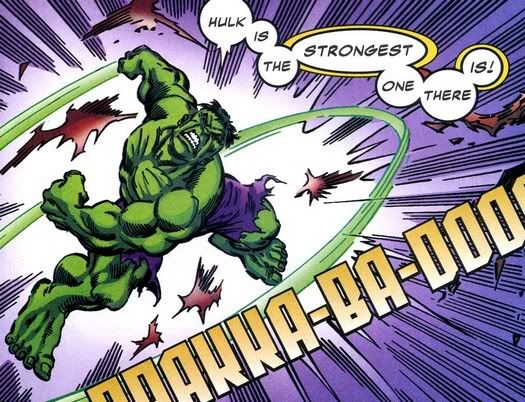
Whatever the Hulk’s stories achieved over the years, producing infectious villains isn’t one of them. Love ‘em or hate ‘em, the distinguished men and women of Hulk’s rogue’s gallery don’t see a lot of travel outside the home title. For the most part, the only Hulk-centric bad guys who get significant time in other titles are ones who “belonged” to other heroes first like Rhino and the Absorbing Man. As prone to resurrection as super-people may be, with notable exceptions Hulk villains are some of the most likely to stay dead simply because no one cares enough about them to bring them back.
Regardless, as far as this Hulkling is concerned, no Marvel villain so thoroughly deserved his horrific fate as the dark-hearted bastard who lived and died for less than a year in Incredible Hulk – the Puffball Collective.
The Puffball Collective was a product of Bill Mantlo’s final, epic Incredible Hulk storyline known to Hulk fans as “The Crossroads Saga” ; a story that left the groundwork for Peter David’s definitive run on the title and one that was likely a major influence on Greg Pak’s “Planet Hulk.”
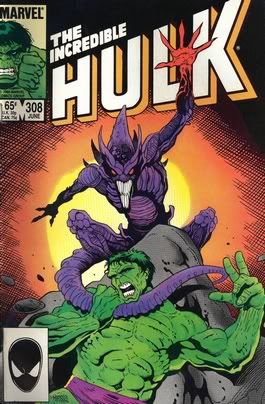 For a time Bruce Banner could control his transformations into the Hulk’s body and could take charge of the Hulk’s body once he did change. He was pardoned for his crimes, was invited to rejoin the Avengers (an invitation he turned down, much to my disappointment at the time), and tried to rebuild his life. Unfortunately, knowing Hulk and Doctor Strange were friends, the villain Nightmare slowly infiltrated Banner’s mind through his dreams and was determined to use the Hulk to kill Strange (and that is why Banner Hulk was such a dick in Secret Wars). The end result was what Strange believed to be the equivalent of Bruce Banner’s psychic death, and the Hulk that was left behind was more powerful and savage than ever. He could not speak at all, even in the classic monosyllabic “Hulk Smash” speech pattern, and simply lashed out at everything and everyone within reach. Strange’s solution was to banish the Hulk to a dimensional crossroads connected only to worlds either uninhabited or inhabited by creatures whose physical power was comparable to that of the Hulk’s. The green guy spent over a year in the Crossroads, from Incredible Hulk #s 301 – 313 and Incredible Hulk Annual #13 – until he was finally liberated by the unwitting Canadian superteam Alpha Flight.
For a time Bruce Banner could control his transformations into the Hulk’s body and could take charge of the Hulk’s body once he did change. He was pardoned for his crimes, was invited to rejoin the Avengers (an invitation he turned down, much to my disappointment at the time), and tried to rebuild his life. Unfortunately, knowing Hulk and Doctor Strange were friends, the villain Nightmare slowly infiltrated Banner’s mind through his dreams and was determined to use the Hulk to kill Strange (and that is why Banner Hulk was such a dick in Secret Wars). The end result was what Strange believed to be the equivalent of Bruce Banner’s psychic death, and the Hulk that was left behind was more powerful and savage than ever. He could not speak at all, even in the classic monosyllabic “Hulk Smash” speech pattern, and simply lashed out at everything and everyone within reach. Strange’s solution was to banish the Hulk to a dimensional crossroads connected only to worlds either uninhabited or inhabited by creatures whose physical power was comparable to that of the Hulk’s. The green guy spent over a year in the Crossroads, from Incredible Hulk #s 301 – 313 and Incredible Hulk Annual #13 – until he was finally liberated by the unwitting Canadian superteam Alpha Flight.I was 9 or 10 when the Crossroads Saga began. I had never read comics more bleak or depressing and I desperately wanted the Hulk to find his way home. Most of the Crossroads stories involved the Hulk making friends he would lose either to death – like the spinal-cord symbiote of Incredible Hulk Annual #13 who temporarily restored some of Hulk’s intelligence and whose dying wish was to see the stars; or the gentle, elephantine giant of Incredible Hulk #304 who was executed for his pacifism – or to brutal transformation, like the emerald-skinned beauty of Incredible Hulk #s 302 and 303 who was so reminiscent of the late Jarella. Adding insult to injury, the Hulk’s power was not nearly as impressive in the violent worlds of the Crossroads as it was on Earth. The Hulk never had his ass handed to him more frequently, perhaps most memorably by a red-skinned child in Incredible Hulk #303.
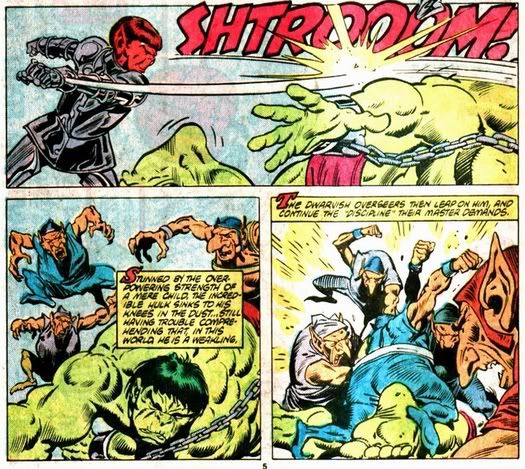
In the beginning, there was one bright spot of hope – the Puffball Collective. He showed up for the first time in Incredible Hulk #301. The creature was exactly what it sounded like. It was a floating cloud of white, puffy balls acting in tandem like a swarm of insects. It could assume different shapes, enjoyed an encyclopedic knowledge of the Crossroad’s different portals, and was telepathic. The one thing it couldn’t do was leave the Crossroads. Unlike the Hulk who could pass through the portals to other worlds as he wished, the Puffball Collective was stranded within the Crossroads itself; cursed to keep company only with the place’s bizarre signpost, the seemingly endless pathways, and the portals they led to.
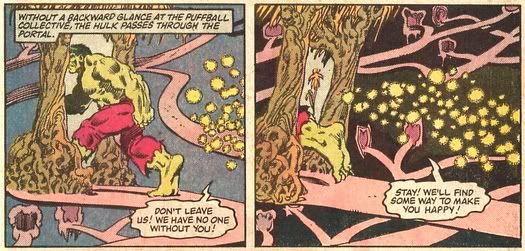
As soon as the Hulk appeared, the Puffball Collective set about winning him over. He pulled images from what was left of the Hulk’s mind and assumed shapes he thought would be pleasing to him (like that of Bruce Banner – he obviously didn’t know the Hulk very well). When he sensed the Hulk was hungry, he assumed the shape of a banquet table loaded with food, though the Hulk didn’t react well when none of it was edible. When the Hulk returned from the world where his symbiote friend died, the Collective assumed the shape of a bed for his fellow prisoner to rest from the emotional wound he was too savage to even remember.

The Hulk proved stingy with his trust. Every time the Hulk entered another portal, the Puffball Collective begged and pleaded for the Hulk to stay with him or to take him along, but the Hulk had only two reactions to the Collective – indifference and rage.
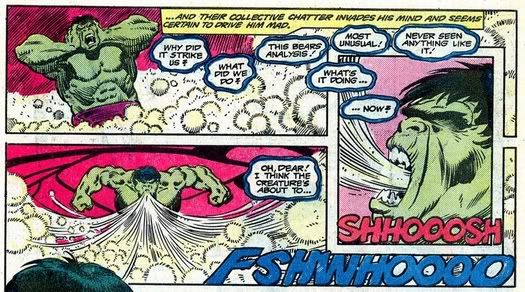
It took the unexpected arrival of the U-Foes at the end of Incredible Hulk #304 for the Puffball Collective to win any trust from his fellow prisoner. Risking torment and death to help the Hulk against the dark parody of the Fantastic Four, the Collective used his knowledge of the Crossroads’ portals to help Hulk defeat them. He had Hulk lure X-Ray, a villain made of radiation, into the portal of a world of radiation-eating monsters; and X-ray’s sister Vapor, made of gas, into a world without an atmosphere. The Puffball Collective’s aid and the sacrifice of some of his collective finally convinced the Hulk that he was a friend.
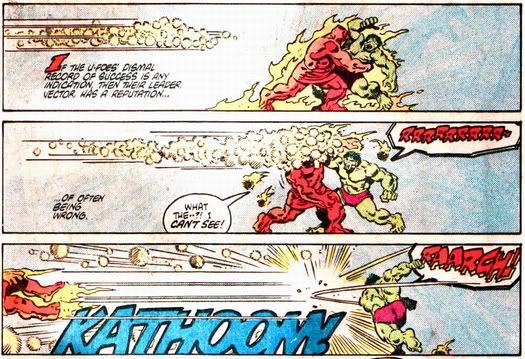
Once the friendship was forged, the Hulk’s loyalty was unwavering. Soon after the defeat of the U-Foes, more of Hulk’s old acquaintances appeared to test that loyalty. The energy-sucking giant Klaatu who first appeared in Incredible Hulk #136 entered the Crossroads, and not far behind was the Pequod-inspired spaceship The Andromeda. Back when Roy Thomas and Herb Trimpe teamed up on the green guy’s adventures, the crew of the Andromeda had recruited the Hulk in their quest to kill Klaatu, and this time was no different. The Hulk would only board The Andromeda if his new Puffball friend could come with him and the ship’s First Mate and Captain – Xeron the Star Slayer and the cybernetic Captain Cybor respectively – didn’t object. Unfortunately, objections or not, the spell that kept the Puffball in the Crossroads was still active, and when The Andromeda escaped the Crossroads to chase Klaatu, the Collective was left behind. The Hulk’s shipmates ignored his howls of protest until finally his fists rocked the spaceship in the middle of its battle with the big, dumb Klaatu (who, irrespective of the obvious Moby Dick analogy, is kind of like Galactus if Galactus never spoke and rather than constructing giant machines and recruiting heralds, just wandered around aimlessly). To quell his anger they returned to the Crossroads for the Puffball Collective and used a force field projector to keep him on board the ship before pursuing Klaatu a second time. The force field worked, though the battle with Klaatu went badly for The Andromeda. They all died, just like they did last time, and the Hulk and the Puffball Collective returned via Doctor Strange’s failsafe spell to the Crossroads. What was most significant perhaps during the Klaatu story was the fact that the Hulk’s friendship with the Collective, combined with the Collective’s telepathic urgings, helped restore a semblance of his old intelligence. For the first time since his banishment, except when his connection to the symbiote of Incredible Hulk Annual #13 lent him intelligence, the Hulk spoke.
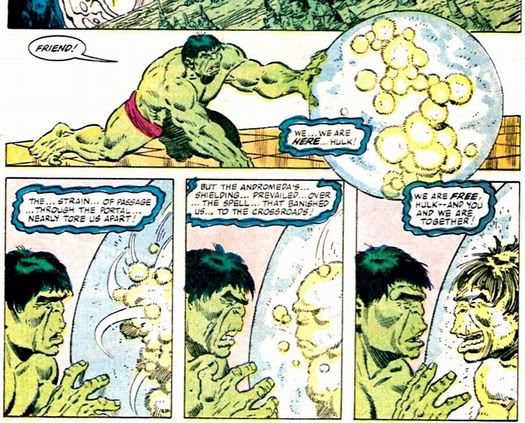
In Incredible Hulk #308, the Puffball Collective’s true intentions were finally revealed. He told the Hulk that inquisitive members of his race accidentally unleashed demons upon his world. He managed to escape to the Crossroads but the demons sealed the portal to his home. Seeing the mystic chains and wall blocking the portal and wanting to please his new friend, the Hulk severed the chains and blasted the wall to pieces. The Hulk and the Collective entered the portal to find the world in ruins. Seeing the Hulk was tired, the Collective told him to rest, that he would watch over him as he slept, and from there things fell apart. The Hulk was attacked by a demon as he slept and seeing the Collective was nowhere in sight, he assumed the Puffball Collective slain by the same demon. When the demon defeated the Hulk and a whole army of the things appeared, so did the Puffball Collective. Sadistically enjoying the beast’s confusion and heartache, the Collective explained to the Hulk that he was the one who let the demons loose upon the world, and that it was no accident. He did not escape his world, he was banished from it and his brethren sealed the portal; sacrificing themselves to make sure the demons did not run loose through all the other worlds connected to the Crossroads. Using Strange’s failsafe spell, the Hulk returned to the Crossroads and was able to seal the portal just in time by reattaching the chains he had severed. He watched the demons turn on his “friend” just as the portal closed.
As a child, no comic book story had such a powerful impact on me. As I’ve written before, it was a relatively friendless childhood that attracted me to the Hulk’s stories. I thought the kids at school misunderstood me just like the other heroes misunderstood the Hulk. In later years when friends would tell me how strongly they related to the X-Men as kids because they grew up feeling like outsiders, I enjoyed a silly and quiet sense of superiority. The muties may have been outsiders, I thought, but at least they had each other. The Hulk was the real outsider. He had no one.
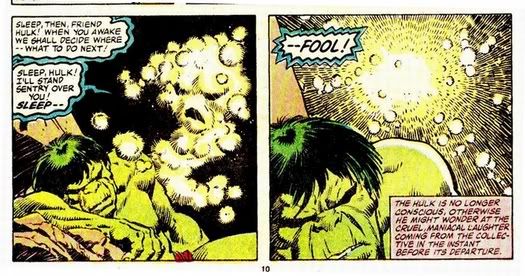
For the Hulk’s one bizarre, constant friend to prove false – in a storyline when making new friends and losing them to horrific deaths seemed like an hourly occurrence – was utterly heart-shattering. I remember reading that first revealing panel, when the Collective yells “FOOL!” - and needing to stare at it a while before turning the page. I just didn’t want to believe it. And once it was clear that the Collective was an evil prick, I was angry. And I wasn’t angry at the character, I was angry at whatever bastards put together that comic. I kept reading Incredible Hulk purely out of faith that eventually there was a light at the end of the tunnel; that the Hulk would go home and find new friends.
Though he would never been heard from again, I have never felt as much absolutely unforgiving hatred for a comic book villain as I did for the Puffball Collective. I wouldn’t put any money that doesn’t come from a board game on the guy returning to comics any time soon. But if he does, rest assured, I’ll be there. I’ll be ready with a flamethrower, a vacuum cleaner, and one of those roller thingees you rub on your clothes to get rid of cat hair.
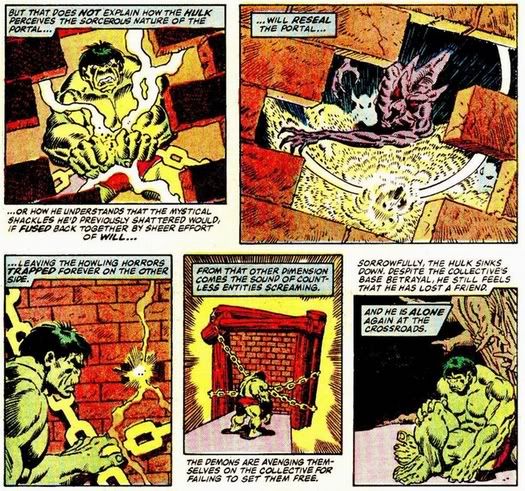
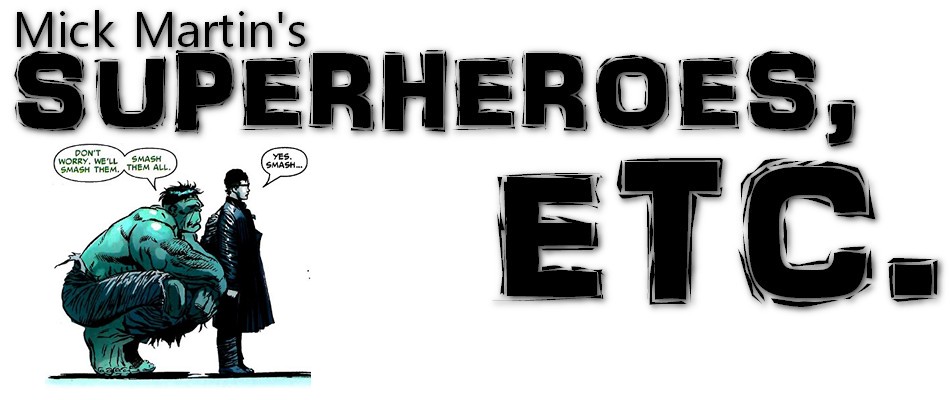
1 comment:
There is a puffball collective in green lantern lore:
http://glcorps.dcuwiki.net/w/Puffball_Collective_Chronology
What is the meaning of this? Explain!
Post a Comment